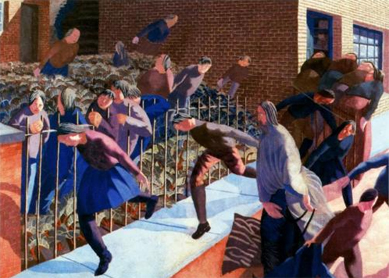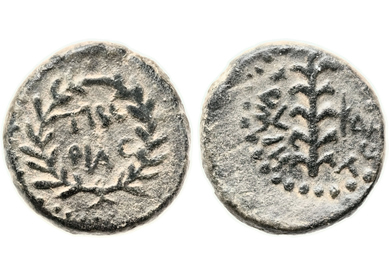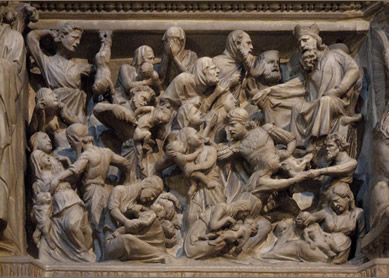A group known as the “Herodians” appear twice in the course of Jesus’s ministry, once in Galilee and a second time in Jerusalem. But who were these people, and what did they stand for?
Where do we find references to the Herodians?
The Herodians are mentioned three times in the New Testament, two of which are in Mark’s Gospel. In Mark 3:6, the Pharisees see Jesus heal a man with a withered hand on the Sabbath in a Galilean synagogue; their immediate response is to go and conspire with the Herodians on how to put him to death. In Mark 12:13, the Herodians once again join forces with the Pharisees, this time in Jerusalem, and ask Jesus whether he supports the payment of taxes to Caesar. In response to Jesus’s clever answer (“Render to Caesar what belongs to Caesar, and to God what belongs to God”), the Herodians are amazed and disappear from the narrative.
The third and final reference to the “Herodians” is in Matt 22:16, which is a retelling of the taxes question from Mark 12:13. Neither Luke nor John mentions the Herodians at all; the former’s silence is perhaps a little strange, given his particular interest in the Herods who ruled over various parts of Israel-Palestine in the first century (Luke 1:5, Luke 3:19-20, Luke 9:7-9, Luke 13:31-3, Luke 23:6-12).
Who were the Herodians?
The Herodians have been explained in various ways. Some have suggested that they were a religious sect, perhaps even identical with the Essenes or the Sadducees. More likely, however, they were political supporters of Herodian rule. The reasons for thinking this come from the Greek term Herodianoi itself. The word is not used before Mark’s Gospel, though Josephus uses a related term, Herodeioi, to talk about those around Herod I (War 1.319). The ending to Mark’s word (–iani) is Latin in form. Similar Latin constructs include Caesariani, which means both the household and servants of Caesar and his political supporters, and Pompeianoi, followers of Pompey the Great. (Christ-followers, too, are known as Christianoi in Acts 11:26, Acts 26:28, and 1Pet 4:16). The Herodians in Mark, then, are likely to have included the household servants and slaves of Herod Antipas (the ruler of Galilee and Perea in Jesus’s day), along with his officials and courtiers and all those who sought to uphold (and perhaps extend) Herodian rule in the region. Whether they specifically promoted Herod Antipas or the Herodian dynasty more generally is difficult to say, as is the question of whether they formed an organized “party” or (perhaps more likely) a looser association.
Did the Herodians have religious beliefs?
A number of later Christian writers claim that the Herodians revered Herod I as the messiah. This is not impossible: Herod’s rebuilding of the Jerusalem temple may well have led his supporters to see him as a second Solomon, a new “Son of David,” an anointed king of the Davidic line. Supporters of Herod, and the dynasty more broadly, may have seen rule by Jewish client kings as their best option in the face of the ever-advancing Roman presence in the East. Perhaps those under Herod Antipas hoped that he might be made king (an ambition he shared himself), while those under Agrippa I (41-44 CE) may have thought their dreams were realized, at least until his untimely death crushed their hopes.
How do the Herodians fit into the life of Jesus?
The view that the Herodians were the supporters of Herod Antipas makes good sense of the passages where they appear in the gospels. In Mark 3:6 (followed closely by Matt 22:16), the Pharisees want to put Jesus to death. In Herodian Galilee, this would have needed the involvement of Herod Antipas, and the Herodians were the obvious people to approach. Regardless of the historicity of the account, the narrative makes sense in the context of Mark’s narrative. Similarly in Mark 12:6, as supporters and courtiers of Herod Antipas, the Herodians would have taken an interest in Jesus and his political views. Herod Antipas had already executed John the Baptist, but who was this Jesus with his itinerant ministry and talk of a kingdom? Was he setting himself up against Rome? The question of payment of taxes was an obvious way to gauge his political views (and perhaps to discredit him in the eyes of the people). Antipas himself may have taken a keen interest in Jesus and might well have sent his supporters to spy on him.
Whatever we make of these two incidents, the presence of the Herodians in the gospels may well go back to an historical memory that these people were supporters of Herod Antipas.
Bibliography
- Taylor, Nicholas H. “Herodians and Pharisees: The Historical and Political Context of Mark 3:6, 8:15.” Neotestamentica 34 (2000): 299-310.
- Jensen, Morten. “Herod Antipas in Galilee: Friend or Foe of the Historical Jesus?” JSHJ 5 (2007): 7-32.
- Meier, John P. “The Historical Jesus and the Historical Herodians.” JBL 119 (2000): 740-46.
- Bond, Helen K. The Historical Jesus: A Guide for the Perplexed. New York: Bloomsbury, 2012.





